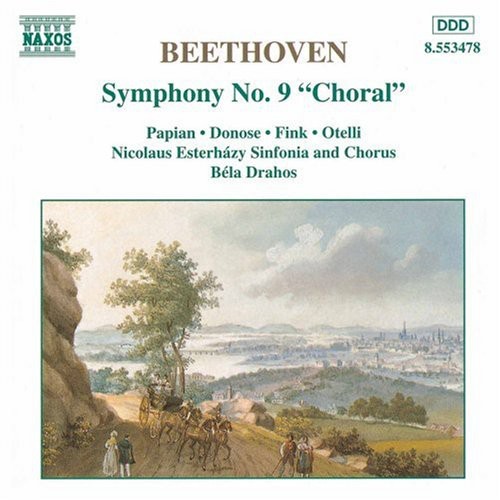Show results for
Deals
- 4K Ultra HD Sale
- Action Sale
- Alternative Rock Sale
- Anime sale
- Award Winners Sale
- Bear Family Sale
- Blu ray Sale
- Blues on Sale
- British Sale
- Classical Music Sale
- Comedy Music Sale
- Comedy Sale
- Country Sale
- Criterion Sale
- Electronic Music sale
- Fantasy Film and TV
- Folk Music Sale
- Hard Rock and Metal Sale
- Horror Sci fi Sale
- Jazz Sale
- Kids and Family Music sale
- Kids and Family Sale
- Metal Sale
- Music Video Sale
- Musicals on Sale
- Mystery Sale
- Naxos Label Sale
- Olive Films on Sale
- Page to Screen Sale
- Paramount Sale
- Pop and Power Pop
- Rap and Hip Hop Sale
- Reggae Sale
- Rock and Pop Sale
- Rock Legends
- Soul Music Sale
- TV Sale
- TV Sale
- Vinyl on Sale
- War Films and Westerns on Sale

Symphony 9
- Format: CD
- Release Date: 6/10/1997

Symphony 9
- Format: CD
- Release Date: 6/10/1997
- Composers: Ludwig van Beethoven
- Conductors: Béla Drahos
- Orchestras: Budapest Nicolaus Esterhazy Sinfonia
- Performers: Hasmik Papian, Manfred Fink, Nicolaus Esterh zy Chorus, Nicolaus Esterházy Chorus, Ruxandra Donose
- Label: Naxos
- UPC: 730099447829
- Item #: NAX944782
- Genre: Classical
- Release Date: 6/10/1997

Product Notes
Beethoven wrote nine symphonies, the first heralding the new century, in 1800, and the last completed in 1824. Although he made few changes to the composition of the orchestra itself, adding, when occasion demanded, one or two instruments more normally found in the opera-house, he expanded vastly the traditional form, developed in the time of Haydn and Mozart, reflecting the personal and political struggles of a period of immense change and turbulence. The first performance of the Symphony in D minor, Opus 125, took place at the Karntnertor Theatre on 7th May, 1824, after a great deal of wrangling over the whole matter, and was a tremendous success with a public that Beethoven thought he had lost to Rossini. The composer, too deaf to direct the performance, indicated the tempi of each movement, the real conductor Umlauf having instructed singers and players to pay no attention to Beethoven, who could hear nothing of the proceedings. The work is scored for pairs of flutes, oboes, clarinets, bassoons, trumpets and drums, with four French horns and the usual strings, to which the composer added three trombones, a double bassoon, a piccolo, triangle, cymbals and bass drum. The symphony was commissioned and paid for by the Philharmonic Society of London, but was dedicated by Beethoven to the King of Prussia, Friedrich Wilhelm III. The last movement provides a necessary link between the purely instrumental world of the rest of the symphony and the great setting of Schiller's words. There is an abrupt outburst from the orchestra, now joined by the double bassoon, followed at once by a baritone recitative, an abjuration of orchestral convention and an exhortation to sing a song of joy. This is followed by the famous theme, in fact structurally the principal theme of a rondo, that is to be varied in so many ways. The baritone is joined by the chorus and then by the other three soloists in it's declaration of human brotherhood.

